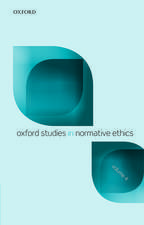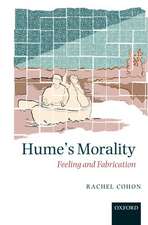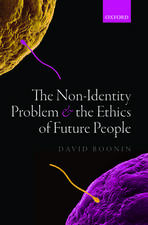An Ethics of Dissensus: Postmodernity, Feminism, and the Politics of Radical Democracy
Autor Ewa Ziareken Limba Engleză Paperback – 31 mai 2002
What kind of challenge does sexual and racial difference pose for postmodern ethics? What is the relation between ethical obligation and feminist interpretations of embodiment, passion, and eros? How can we negotiate between ethical responsibility for the Other and democratic struggles against domination, injustice, and inequality, on the one hand, and internal conflicts within the subject, on the other? What are the implications of postmodern ethics for the agonistic politics of radical democracy?
We cannot address such questions, Ziarek argues, without putting into dialogue discourses that have hitherto been segregated: postmodern ethics, feminism, race theory, and the idea of radical democracy. Addressing a constellation of diverse thinkers—including Emmanuel Levinas, Patricia Williams, Jean-François Lyotard, Michel Foucault, Frantz Fanon, Julia Kristeva, and Luce Irigaray—the author proposes a new conception of ethics, an ethics of dissensus that rethinks the relation between freedom and obligation in a double context of embodiment and antagonism.
As the unavoidable yet productive dissonance among antagonism, freedom, and obligation suggests, the ethics of dissensus seeks not to transcend politics but to articulate the difficult role of responsibility and freedom in democratic struggles against racist and sexist oppression. Opposing the conservative political work of privatized moral discourse that reduces social antagonism to the apolitical experience of good and evil, the ethics of dissensus calls into question not only the depoliticized subject of ethics but also the disembodied notions of citizenship, rights, and democratic community.
We cannot address such questions, Ziarek argues, without putting into dialogue discourses that have hitherto been segregated: postmodern ethics, feminism, race theory, and the idea of radical democracy. Addressing a constellation of diverse thinkers—including Emmanuel Levinas, Patricia Williams, Jean-François Lyotard, Michel Foucault, Frantz Fanon, Julia Kristeva, and Luce Irigaray—the author proposes a new conception of ethics, an ethics of dissensus that rethinks the relation between freedom and obligation in a double context of embodiment and antagonism.
As the unavoidable yet productive dissonance among antagonism, freedom, and obligation suggests, the ethics of dissensus seeks not to transcend politics but to articulate the difficult role of responsibility and freedom in democratic struggles against racist and sexist oppression. Opposing the conservative political work of privatized moral discourse that reduces social antagonism to the apolitical experience of good and evil, the ethics of dissensus calls into question not only the depoliticized subject of ethics but also the disembodied notions of citizenship, rights, and democratic community.
| Toate formatele și edițiile | Preț | Express |
|---|---|---|
| Paperback (1) | 198.66 lei 3-5 săpt. | |
| Stanford University Press – 31 mai 2002 | 198.66 lei 3-5 săpt. | |
| Hardback (1) | 705.58 lei 6-8 săpt. | |
| Stanford University Press – 31 mai 2002 | 705.58 lei 6-8 săpt. |
Preț: 198.66 lei
Nou
Puncte Express: 298
Preț estimativ în valută:
38.02€ • 39.55$ • 31.39£
38.02€ • 39.55$ • 31.39£
Carte disponibilă
Livrare economică 25 martie-08 aprilie
Preluare comenzi: 021 569.72.76
Specificații
ISBN-13: 9780804741033
ISBN-10: 0804741034
Pagini: 304
Ilustrații: index
Dimensiuni: 152 x 229 x 20 mm
Greutate: 0.45 kg
Ediția:1
Editura: Stanford University Press
Colecția Stanford University Press
ISBN-10: 0804741034
Pagini: 304
Ilustrații: index
Dimensiuni: 152 x 229 x 20 mm
Greutate: 0.45 kg
Ediția:1
Editura: Stanford University Press
Colecția Stanford University Press
Recenzii
"Ziarek has produced one of the most sensitive, thoughtful, original, and quietly provocative texts I know in the broad areas of contemporary philosophy and sexual and racial politics. . . . Trained in comparative literature and literary studies, she is equally at home in the most difficult and contentious of philosophical texts."—Elizabeth Grosz, State University of New York, Buffalo
"Original, carefully argued, and beautifully written, this book is one of the first sustained attempts to think through the relationship between feminist ethics and feminist politics. Ziarek's nuanced readings of central figures in current debates in postmodern ethics provide not only new ways of interpreting their work but also new directions for ethical theory."—Kelly Oliver, SUNY-Stony Brook
Notă biografică
Ewa Plonowska Ziarek is Associate Professor of English at the University of Notre Dame. She is the author of The Rhetoric of Failure: Deconstruction of Skepticism, Reinvention of Modernism.
Textul de pe ultima copertă
“Ziarek has produced one of the most sensitive, thoughtful, original, and quietly provocative texts I know in the broad areas of contemporary philosophy and sexual and racial politics. . . . Trained in comparative literature and literary studies, she is equally at home in the most difficult and contentious of philosophical texts.”—Elizabeth Grosz, State University of New York, Buffalo
“Original, carefully argued, and beautifully written, this book is one of the first sustained attempts to think through the relationship between feminist ethics and feminist politics. Ziarek’s nuanced readings of central figures in current debates in postmodern ethics provide not only new ways of interpreting their work but also new directions for ethical theory.”—Kelly Oliver, SUNY-Stony Brook
“Original, carefully argued, and beautifully written, this book is one of the first sustained attempts to think through the relationship between feminist ethics and feminist politics. Ziarek’s nuanced readings of central figures in current debates in postmodern ethics provide not only new ways of interpreting their work but also new directions for ethical theory.”—Kelly Oliver, SUNY-Stony Brook
Descriere
Addressing a constellation of diverse thinkers—including Emmanuel Levinas, Patricia Williams, Jean-Francois Lyotard, Michel Foucault, Frantz Fanon, Julia Kristeva, and Luce Irigaray—the author proposes a new conception of ethics, an ethics of dissensus that rethinks the relation between freedom and obligation in a double context of embodiment and antagonism. The author employs discourses that have hitherto been segregated: postmodern ethics, feminism, race theory, and the idea of radical democracy.



























